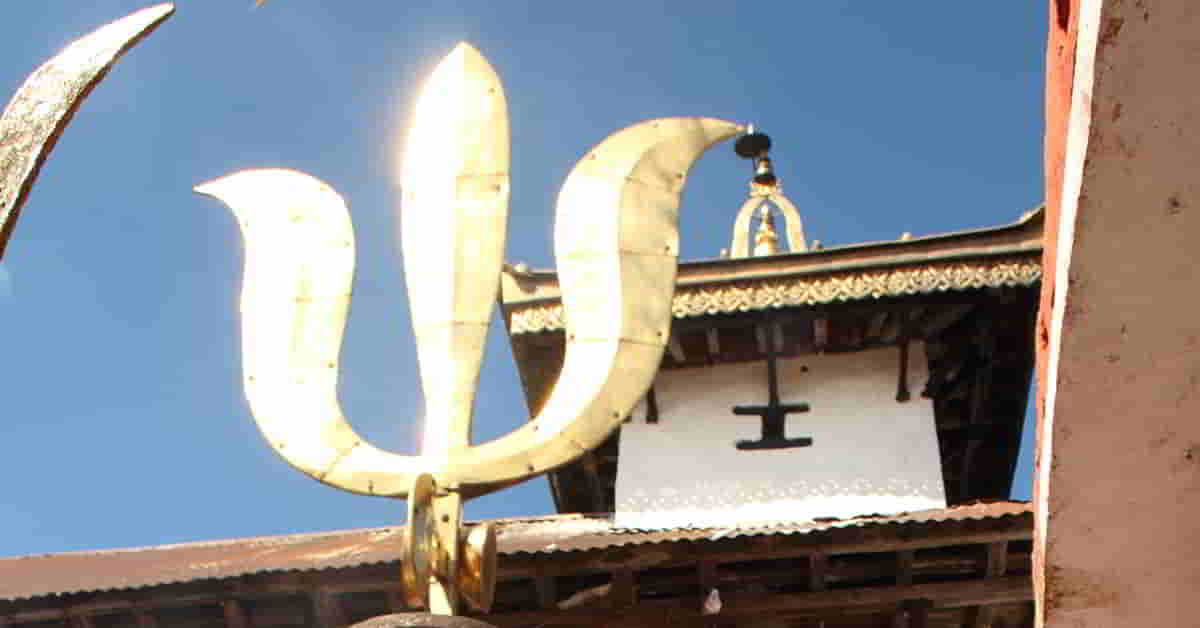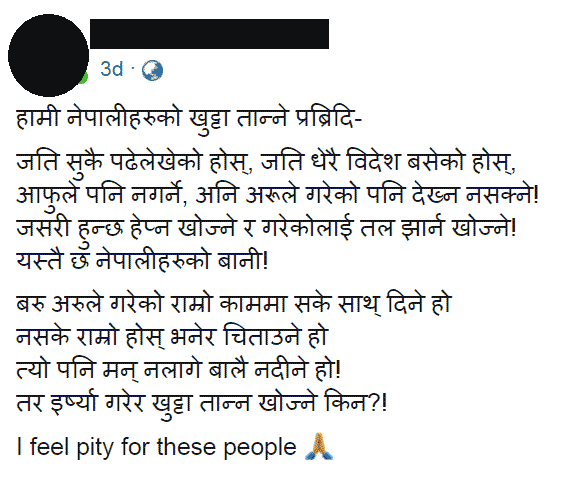 Shiva Temple, Tansen.
Shiva Temple, Tansen.
Apart from Gods and Goddesses, Hinduism has NO shortage of myths. I wouldn’t be surprised if it has a myth explaining or describing the origins of every major fact (!), as well as every single one of their myriad beliefs and practices. 😀
Predominantly Hindu, Nepalis have many peculiar beliefs and practices. One such peculiar practice is “खुट्टा तान्ने प्रवृत्ति” (Khutta tanne prabritti). It translates as “the tendency and practice of pulling others down.” It’s a very unusual but typical manner in which Nepalis give vent to their jealousy — of someone else’s “success,” “fame,” “accomplishment,” or “apparent social mobility” etc.
I have always known about it but for the longest time I had no clue where it could have come from! I had no idea, for example, that origin myths that affirmed it existed. I came across two of them.
Here’s the first one.
Shiva, one of the three Hindu Gods that make up the Hindu’s Holy Trinity (the other two being Vishnu and Brahma), one day decides to fulfill the wishes of people around the world and bring happiness into their lives! He goes around the world meeting and asking people for their wishes & tells them that he would fulfill them and make them happy. (Don’t ask me why it’s the God of Destruction and NOT Vishnu, The Sustainer, who was doing this! Hindu Gods, just like the Christian Gods work in mysterious ways, I guess!!)Moving from one country to another, asking and fulfilling wishes, every person he comes across requests something or things they didn’t personally possess, things they believed would make them happy.He then arrives in Nepal. Approaching the first Nepali he comes across, he says, “Oh human, I am here to grant a wish of yours and to make you happy and fulfilled.”He follows that up with the question, “What do wish for? What would make you happy?”The Nepali responds, “My neighbor had 5 sheep, 3 goats, a couple of water buffaloes and a big house. I wish for them destroyed! That would bring me happiness.”
Yamaraj, the God of Death in Hindu pantheon, holds court in Narka (Hell) inside a massive compound surrounded on all sides by a wall. He restrains the dead that stream into his compound.But, while he condemns the dead of one nationality to be hung by their arms, he suspends another nationality upside down with their head submerged in a pool of water. Still another he chains to a wall, and another ties to a pole etc. The restraints are meant more to prevent them from escaping from the compound and only partly as punishment.He makes an exception though — for the Nepalis. He allows them to roam free inside the compound. And invariably the new arrivals from other countries immediately notice the freedom Nepalis have while they themselves are retrained and told why.Many, invariably, don’t understand and raise the issue. “Why are the Nepalis free to roam around then?! Won’t they escape?”Yamaraj always responds with a question.“You don’t know the Nepalis do you?” He asks.The complainants retort, “No!”To which, Yamaraj chuckles the words “Just watch” as with every new group that question him about it.And they do!What they notice pretty immediately is that any time one Nepali tries to escape from the compound by climbing up and over the wall, a number of other Nepalis rush over and pull the poor fellow down by their legs instead of helping the fellow get over it!
Oh, incidentally, this is something every Nepali knows about, something pretty much every Nepali is aware of about themselves. Everyone in the country joke about it a lot too, of course.
This Nepali song for example makes a reference to it in these three lines:
Matlabi duniyama sathiharu khojxu ma
Khutta tanne prabirti mathi bojh hu ma
Euta khoj hu ma
Here’s the translation:
“I’m in search of friends, in an uncaring world
I’m a burden on [our] tendency to pull others down
I’m a find”
Pulling those doing well — or better — down to their own level is not where Nepalis stop though. Worse still, many, instead of challenging themselves to accomplish more and trying to surpass their successful friend, neighbor, or a business competitor, Nepalis expend time, energy, and effort to even hold others back and prevent them from getting ahead–and thereby also hold back they themselves! My friend Shweta touched on that in her recent Facebook.
Here’s the post, reproduced with her permission.
“The tendency of us Nepalis to pull others down-
Regardless of the qualifications we acquire, regardless of the length of time we spend abroad, we neither do it ourselves, nor are we able to stand to see others doing it! Somehow or in some way, we have a tendency to write off what others are doing and attempt to sabotage what others are doing. That’s generally how Nepalis act.
One should support good works others are doing instead. If unable to do that, one should wish well of those who are trying. If one can’t even do that, then stay out of it. Why be jealous and try to bring them down?!
I feel pity for these people.”
Ujwal Thapa, the founder of Bibeksheel Nepali, a progressive political party, in What stops positive forces from leading Nepal? identifies “khutta tanne prabritti” as one of the nine forces that stop intelligent and talented Nepalis from leading Nepal. (He also lists the ways to overcome those forces.)
“Surely they must be after money – power!”
We are deeply suspicious of positive deeds. If a person starts something promising, we suspect ulterior motives behind it. Our doubts soon take the form of subtle yet vicious rumors which we unknowingly spread just like ‘Chinese whispers’ resulting in vicious lies which only serves to isolate any change maker from potential help. And, unknowingly, we become promoters of a culture of pulling others down – “khutta tanne prabidhi”.
Now, naturally, the next question is: why? Why do we do this? What is the explanation behind this? I have now come to suspect that part of the reason — if not THE reason — may be our social system, the caste system.
In this system everyone has a “taha” (place/position). That is, every single person slots into a rung in the social, caste-based ladder. The rung one slots into is based pretty much entirely on one’s birth, something some believe is divinely determined. Social mobility in Nepali society, therefore, is almost a holy grail. Another consequence of this is that groups that belong to — or are perceived of as belonging to — different social strata struggle to cooperate and collaborate.
To make sure individuals know/recognize their “place”, our society acculturates us — among other things — to prize conformity. The level and extent of that you would likely struggle to find in other similar societies. Nepalis and Nepali society not only expect fellow citizens to conform, under many different circumstances it’s even demanded.
I must say I didn’t see this kind of behavior in the peoples I came across during my life and travels around the world. Of course, I must concede that the reason behind that may just be that I didn’t spend a long enough time with the locals in those countries and/or didn’t learn enough about their cultures and practices etc.

